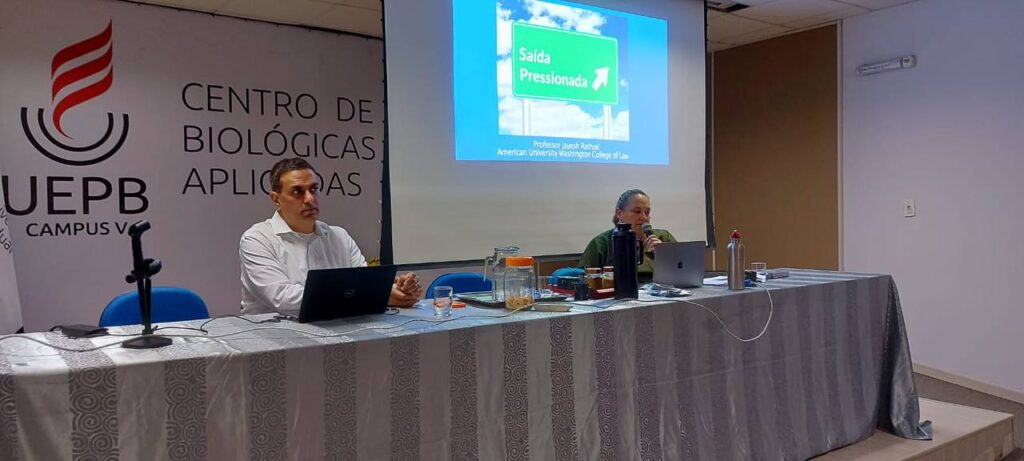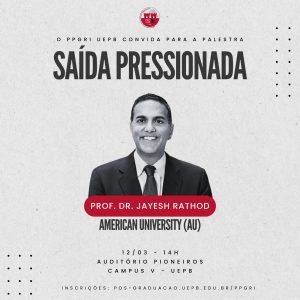For Jayesh Rathod, political and economic crises in the US will drive a ‘pressured exit’

Credit: Natália Constantino
By Lauro Henrique Gomes Accioly Filho* [OPEU Entrevista]

Prof. Jayesh Rathod (Credit: Armando Gallardo/ American University)
Jayesh Rathod is Professor of Law and Director of the Immigrant Justice Clinic at American University Washington College of Law. In 2018, he received the Pauline Ruyle Moore Award for outstanding scholarship in the area of public law. Professor Rathod has worked on cutting-edge cases and projects relating to immigration detention, removal defense (including criminal-immigration intersections), humanitarian relief, immigrant workers’ rights, language access, and more.
He has been invited to speak on immigration and workplace law topics at institutions across the United States, and has served as a commentator in local, national, and international media (including CNN, NBC News, and National Public Radio). He was a Fulbright Scholar at two universities in Brazil, where he taught courses on U.S. immigration law and comparative migration policy, and conducted research relating to the Brazilian immigration system.
In this interview, Professor Jayesh spoke about his forthcoming publication, which was showcased at the recent lecture at the Paraíba State University. His latest research concerns the departure of American residents from the country; however, there are various factors at play for this new scenario in the United States.
OPEU: Professor Jayesh, you have a distinguished career in the field of international migration. When did your interest in this area emerge, and what challenges have marked your professional journey?
My interest in this area begins with my family background. I grew up in a family of immigrants, as my parents immigrated to the United States from India. Growing up, I saw many of the challenges that migrants in the United States face. I grew up helping my parents who did not speak very good English. After that, I attended college and there I became more interested in international issues. And throughout this time, when I was in college, I focused a lot on learning Spanish. Learning other languages was very important to my future development in the field of international migration. Once I finished college I went to law school in New York City and initially focused on international development and international human rights. Gradually, however, I became more interested in looking at immigration issues as a career. This was, I think, a function of living in New York City, where there are many immigrant communities and a lot of challenges. So gradually, I shifted from being more interested in international policy and development issues to become more specifically interested in domestic immigration issues. But there is still a lot of overlap right between the fields. So even now in my work, although I do immigration work in the United States, there’s a lot of overlap, and I have engaged with international human rights and international legal issues during my career. Overall, I’ve been lucky to have a professional career that has been very rewarding.
Migration studies and immigration law is a field that can be very difficult intellectually but also emotionally. There were a lot of changes to U.S law right when I began my career. It was after the attacks of September 11th. I started practicing in 2001 and in the very first year, the law and the whole system changed. So that was challenging. Also, it’s difficult sometimes to work with communities that are adversely affected by immigration policy changes, including Muslim, Latino, and other communities that are facing a lot of hostility.
But another challenge I have navigated is more of a disciplinary challenge. I studied social science theory in college, but as somebody who’s trained in the law, we often think about only the role the law can play and how the law can be used as a tool to generate a solution. But now I have a better understanding of the complexity of migration issues and the importance of looking at other disciplines and perspectives, and not just relying on the law.
OPEU: Providing a historical overview of the recent U.S. presidencies, Donald Trump (2017-2021) and Joe Biden (2021-), what differences can be observed in their immigration policies?
There are some differences between the two, some very significant, but also surprisingly some areas where there is overlap. Talking about Trump, there were many aspects of his policies that we still remember today. First, there was an attack on humanitarian migration, limiting the asylum system, and trying to eliminate protections like Temporary Protected Status. Another area was enforcement at the border, limiting the number of people who can come into the country, and imposing policies like Remain in Mexico, which required people to wait outside the United States even if they wanted to apply for asylum. Of course, we need to think about all of the travel ban, including the Muslim travel ban. There were others, not to mention the restrictions that were imposed during the pandemic.
One thing about Trump that we don’t often discuss is, in addition to all the obvious policy changes, the steps that he took which we call the “invisible wall.” He wanted to build a physical wall, but he also did many other things to slow down migratory processes – such as taking longer to process green cards or more time to schedule interviews. All of those things slow down the process. It’s important to think about that as a kind of “invisible wall” in addition to the physical wall.
 In addition to the physical wall, there is an “invisible wall”. In the photo (file), white crosses with the names of those who have died crossing the US border adorn the Mexican side of the wall in Heroica Nogales, Mexico (Credit: Jonathan McIntosh/ Flickr)
In addition to the physical wall, there is an “invisible wall”. In the photo (file), white crosses with the names of those who have died crossing the US border adorn the Mexican side of the wall in Heroica Nogales, Mexico (Credit: Jonathan McIntosh/ Flickr)
Biden changed some of Trump’s policies. For example, he has made it a little easier for some humanitarian migrants to enter the country. Also, Biden has greatly increased opportunities for people to enter on temporary statuses, which has its own problems. But that’s something that he’s done. He has made the process of applying for citizenship a little bit faster. But where we’re seeing some similarities is at the border. This is a big political issue for him. He is continuing a restrictionist approach at the border itself and that is because he wants to limit people coming across the physical borders, and instead encourage more orderly ways to get into the country.
OPEU: Considering the ongoing electoral period in the United States, what is your perspective on the potential return of Donald Trump to the Presidency?
The political situation in the United States right now is very unstable. Part of the problem is that our electoral system has many problems. Some of the problems are structural, and some of them are external. For example, as you know, we do not elect a president based on popular vote; it’s based on the Electoral College. So this year, only a few states are going to decide the election: Michigan, Arizona, Pennsylvania, Wisconsin, Florida, and North Carolina among others. It’s really seven or eight that will decide who becomes the president. We don’t have mandatory voting in the United States. We also have many states that have passed laws to make it more difficult to vote; they’ll say you need to bring your ID to vote or will limit the number of places where people can go to vote. It’s an attack on voting rights.
But then there are other factors that are not about the electoral system. Biden has a financial advantage. The Republican National Committee, the committee overseeing the Republican Party, is not in a good financial position. On the other hand, a problem that Biden has is what’s happening in the Middle East. His support for Israel is a problem because there are many Democrats who do not like that policy, and they want Biden to do more support for Palestine. Their concern about his age is a problem too, and some say he’s too old to be president. But now at the same time, people are also becoming concerned about Donald Trump’s mental status. But the good thing for Biden is the economy seems to be good. Normally if the economy is good, the president who is the incumbent will get reelected.
So, if hypothetically Trump wins, well, he’s already said that he wants to deport a lot of people, and the immigration situation will become very restricted. But there are some things that the president can do and others that require Congress, and he can’t change all of the laws. Last time he tried to do a lot of things on his own via Executive Orders, and then those who oppose the policies will file lawsuits, and the policies often get put on hold while they are litigated. This pattern would likely repeat itself if he gets re-elected.
OPEU: Recently, you delivered a lecture at the State University of Paraíba on “Saída Pressionada” addressing a forthcoming publication. What motivated your choice of this theme?
It was both academic and personal interest. On the academic side, when I was here in Brazil in 2016-17, I became more interested in comparative migration policy and looking at how different countries adjudicate refugee claims. This motivated me to begin looking at the migration system more globally in my own academic research. And at the same time, there was also an article that I read, it was by an American lawyer who was asking the question “Can African Americans receive asylum in other countries?”

The professors Jayesh Rathod and Cristina Pacheco, at the event promoted by the Postgraduate Program in International Relations (PPGRI) at UEPB, on March 12. 2024, in João Pessoa (Credit: Syria Bandeira/UEPB/Personal file)
So those were some of the intellectual forces that led me to explore the issue of U.S citizens leaving the country. But at the same time, this was during the Trump years, and I myself was feeling some sense of instability and insecurity. I was thinking, “What would I do if I had to leave the country? How would I get out? Where would I go?”
Those two things combined and led me to research the topic. As a researcher and scholar, I’m interested in topics that are connected to what is happening in real life and that are affecting real people’s lives. This is an issue that people are talking about, but hasn’t been studied, so I wanted to study it more.
OPEU: Do you think that all the things that you are studying are related to the far right ascension with Trump highlighted in this scenario? And you think that the hypothetical Trump return to Presidency can explore more about this new publication that you are working on? Would the phenomenon of emigration by Americans grow in a hypothetical event of Trump’s return to the Presidency?
Definitely, I think that this concern about the growth of the far right is a big factor that contributes to people feeling unstable in the United States. Feeling that politically and socially, either that the policies may change to make the country more conservative, or even if the policies don’t change, there’s going to be more conflict in the society. Which is another reason why people want to think about leaving, right? So even if they themselves aren’t worried about being harmed directly, they may just not want to live in a society that’s so conflictive.
There is not a lot of evidence that he’s going to implement policies that will be economically beneficial enough for those communities to really prevent them from leaving. Is he really going to make access to health care easier? That seems doubtful. Is he really going to push to lift the minimum wage? What is he going to do to bring more jobs? Maybe some type of restrictionism? And by that I mean trade policies that might have some kind of impact. But I think it’s not clear that his economic agenda is going to help the people who are being forced to think about leaving the country. It’s interesting that they might support him politically and ideologically, even if electing him will not change the economic reality for them. We’ll see.
OPEU: Many scholars in the gender studies field, such as Jasbir Puar and Judith Butler, highlight the significant challenges faced by the LGBTQIA+ community in their daily lives. How do these individuals navigate the realm of migration in the United States, particularly those who are residents of the country?
We have a president who’s a centrist, but at the state level, we have very conservative governors in some states. In many of those states, they’re passing laws that are very restrictive, especially towards the trans community. So the fear that people have is if we have a right wing president, and let’s say the Congress also becomes Republican, they could easily pass laws that are very hostile to the LGBT community. Plus, we have a Supreme Court that has suggested that it’s going to eliminate some rights for LGBT people, including the right to marriage. People are nervous and as a result they are starting to make what I would call an “exit plan.” They are not necessarily going right away, but thinking about the possibility. They are getting another citizenship or getting some other status in another country that they can use in case of emergency. That said, keep in mind that while a lot of people are planning, other people are not in a financial position to plan. Maybe they have other challenges, such as mental health challenges, physical limitations, or are geographically isolated.
Additionally, the community is asking itself: “If I’m going to go, where am I going to go?” Maybe things are bad here, but is it going to be safer in the United Kingdom? Maybe not… So imagine if you’re in a same sex couple and you’re married in the US, you would want to go to a country that recognize the marriage. Similarly, if you’re a trans person in the US and you’re getting hormone therapy, you think about, “What country am I going to be able to get that support?” As an LGBT person, there are a lot of things to think about.
OPEU: Do you perceive the role of neoliberalism in the rise of the far right in the United States and in the phenomenon of emigration among Americans, specifically those who benefit from white privilege?

Source: UEPB’s website
Neoliberalism has taken root over the last 40 to 50 years, promoting very relaxed, free market economic policies which have resulted in many economic transformations in the US. These have impacted a lot of communities, including a lot of white Americans. And with these neoliberal policies, you’re seeing the impact on some industry in the US. Globalization and access to different transnational labor markets have really hurt a lot of the working class. That has been happening for decades and I mentioned this at the lecture (see image on the side) at the State University of Paraíba on “Saída Pressionada”. But I think there’s another parallel phenomenon that’s very important, which is the demographic diversification of the United States.
Starting in the 1960s, immigration law changed, it eliminated a lot of barriers to immigration for people from Africa, Asia and the Middle East. A lot of immigrants started coming in beginning in the 1960s. And over the last 60 years, the demographics in the US have changed a lot. Now you have many more minorities living in places in the US where before it was mostly white. This helps the far right to create the rhetoric that’s criticizing immigrants, as the standard “Make America Great Again”. But also, these neoliberal policies are resulting in a lot of economic hardship for white Americans and so they’re looking outside of the country for places to retire that are more affordable.
As I say in my lecture, you have this irony where you have communities of people that have been attacking immigrants, but then some of those same communities are sending people overseas to live out their retirement years because it’s more affordable. They move to Ecuador, Costa Rica, Panama, Columbia, and other countries. Even though they may be critical of migrants to the U.S. who are coming from those countries. And so, yes, a big part of that is linked to neoliberalism. But part of it is the concept of white privilege. Some of the interviews that researchers have done have shown that some of the reasons why people leave, in addition to the economic difficulty, is because they are looking for a different, more idealized environment. They will say things like, “the United States is not the same as it was before, it just feels more dangerous, it feels different from when I was a child, etc.” Oftentimes this is an indirect way of reacting to the demographic diversification of the country. I don’t want to attack those people because I think their sense of discomfort is real and it’s often not just an explicit prejudice. It’s more complicated than that.
Then, by leaving the United States, ironically, going to a country where they have much more social status as a white person, for some people, this can be very appealing, even if they’re not thinking of it intentionally or explicitly. It’s among the factors that are motivating people to go.
* Lauro Henrique Gomes Accioly Filho is a Master’s student in the Postgraduate Program in International Relations at the State University of Paraíba (UEPB). Contato: lauroaccioly.br@gmail.com.
** Review and final editing: Tatiana Teixeira. Interview carried out on March 14th 2024. Its content does not necessarily reflect the opinion of the OPEU, or the INCT-INEU.
Subscribe to our Newsletter and receive OPEU content by email.
Follow OPEU on Instagram, Twitter, Linkedin and Facebook and follow our daily posts.
Comment, share, send suggestions, be part of our community.
We are a research observatory on the United States,
with weekly, free, non-profit content.





















